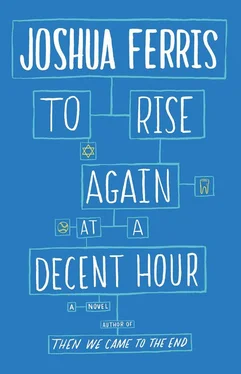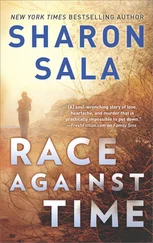To be honest, you can’t get a damn thing done without a good dental assistant. And Abby was very good. She would even hold a patient’s hand. But I thought she had management issues. If she had a complaint or a suggestion or simply wanted an afternoon off, she wouldn’t come to me. She’d go to Connie or Mrs. Convoy. She said it was because she was afraid to disturb me. Afraid to disturb me? We sat across from each other all day long! She probably would have preferred someone else to sit across from, like one of those cheery dentists who love people and make winning remarks that entertain everybody — which is all I’ve ever wanted for myself. I wanted her to stop sitting across from me in silence, constantly judging me. Maybe she wasn’t judging me. Maybe I just couldn’t read her behind that pink paper mask always obscuring her features. Maybe she was simply waiting to hand off the next instrument with the professionalism I required. But you try having a dental assistant follow you around all day and sit across from you when you’re not feeling witty or cheery and see if you don’t feel judged.
“Are all the rooms prepped?” I asked Abby first thing when I came in that morning.
I wanted nothing more than to say good morning first thing in the morning. Saying good morning was good for morale, conveying to everyone in their turn, Isn’t it something? Here we are again, wits renewed, armpits refreshed, what exciting surprises does the day hold in store? But some mornings I couldn’t bring myself to do it. We were a cozy office of four; three good mornings, that’s all that was ever asked of me. And yet I’d withhold my good mornings. Ignoring the poignancy of everyone’s limited allotment of good mornings, I would not say good morning. Or I would in all innocence forget about our numbered opportunities to say good morning, that horrifying circumscription, and simply fail to say it. Or I would say good morning sparingly, begrudgingly, injudiciously, or tyrannically. I would say good morning to Abby and Betsy but not to Connie. Or to Betsy but not Abby or Connie. Or to Abby in front of Betsy, and to Betsy in front of Connie, but not to Connie. What was so good about it anyway, the too-often predictable, so-called new morning? It was usually preceded by a long struggle for a short drowse that so many people call night. That was never sufficiently ceremonial to call for fresh greetings. So instead I’d say to them, “Where’s the day’s schedule?” If I said, “Where’s the day’s schedule?” I was saying that to Connie, who worked the desk. Or I’d say, “Are all the rooms prepped?” as I said that morning, the morning in question, and that would be directed at Abby. I’d say that first thing, at the start of the day, as if I expected the rooms not to be prepped, and for the rest of the day, Abby would sit across the patient from me mutely breathing inside her mask, soberly handing off the instruments, and silently judging me in the harshest of terms. Or I’d say to Betsy, “You’re alone today,” meaning that she would have no help from a temp hygienist, and she would reply, “Somebody’s in a foul mood.” And I wasn’t, in fact, in a foul mood, despite coming off another futile attempt at a good night’s sleep, and seeing again all too soon my same three employees from the day before. I wasn’t in a foul mood until the very moment Mrs. Convoy said, “Somebody’s in a foul mood,” which would invariably set the course for a day spent in the blackest of moods.
But good morning! good morning to ye and thou! I’d say to all my patients, because I was the worst of the hypocrites, of all the hypocrites, the cruel and phony hypocrites, I was the very worst.
Among my patients that Friday morning was a man I’ll call Contacts. Contacts was in for some cosmetic work. More patients were coming in for cosmetic purposes than ever before. They wanted whiter smiles, straighter smiles, less gummy smiles, gum bleachings and lip repositionings, smiles whose architecture was remade tooth by tooth, millimeter by millimeter, until every bad memory from childhood had been eradicated. They wanted George Clooney’s smile or Kim Kardashian’s smile or that beefy knock-kneed smile of Tom Cruise’s, and they brought in clippings of lesser celebrities whose smiles they hoped I could give them so that they, too, could smile like celebrities and walk the streets like celebrities and live forever and ever in the glow of celebrity. These were patients who could afford to indulge themselves, lawyers and hedge-fund managers and their spouses who had no more appetite for imperfection, and socialites who made the rounds of museum galas catching the light of every flash. And then, in contrast, there were those who, with no insurance, came in from complications from a self-pulled tooth yanked with pliers in the kitchen of a rent-controlled walk-up after putting away half a bottle of Jim Beam. They dealt with their growing toothaches not with dental exams but with aspirin, whiskey, and whatever scripts they could get from their disability docs. Some of them had to be immediately referred to the emergency room. These were the same people who were often resented in life for being closed off and hostile because they never smiled, but they never smiled not because of some personality flaw but from a lifelong embarrassment of their yellow stains, rotted grays, and dark edentulous gaps. If, after years of torment and slow savings, they came to see me before catastrophe struck, they often broke down in the chair, men and women alike, and then out it came, everything: their terrible nicknames, their broken hearts, their blown opportunities and arrested lives. All on account of some fucking teeth. There were days I considered myself singularly ill suited to my profession, which required the daily suspension of any awareness of the long game, a whistling past the grave of every open mouth. I spent all my energy on the temporary, the stopgap, and the ad hoc, which made it hard to convince myself that a patient’s biannual maintenance was anything more than a necessary delusion. But when I got to work on those chronic unsmilers, and they came back after the sutures healed and the anchors held steady to thank me for giving them their lives back — indeed for giving them any life at all — I felt good about what I did, and damn the long game to hell.
Anyway, I was bonding a new set of incisors to Contacts when he took out his me-machine and began scrolling through his contacts. It was a simple bond job, it wasn’t brain surgery. Still, it required a little focus and some patient cooperation. Let me tell you something. If brain surgery could be done without anesthesia, you’d have the brain-surgery patients scrolling through their contacts, too. The array of activity people found acceptable in the chair never ceased to amaze me. Mrs. Convoy once had a patient unscrew a bottle of nail polish one-handed during a cleaning and begin to paint her nails. That provoked a passionate sermon on the deplorable state of respect in contemporary society, from which the poor girl could neither escape nor, with Mrs. Convoy’s scraper in her mouth, offer any rebuttal. I asked the guy with the sudden pressing need to scroll through his contacts if he might put his phone away, which he did only after firing off a text. He got me thinking about a certain time in my life. When the Prozac stopped working and my Spanish stalled, I started going to the gym. My friend McGowan had encouraged it. Together we would lift things and put them down again. That was something that was almost everything for about a month and a half, the gym’s racks of shiny weights and promises of sexual prowess, until the dismal lighting got to me and I took up indoor lacrosse. I remembered telling McGowan how I’d been flicking through all my contacts the night before when it occurred to me that many of them couldn’t be considered real friends. I decided to delete a whole bunch, even if they were people I’d known forever. It bothered McGowan that I would do that. “Those are your contacts, man,” he said. “Yeah? So?” “Don’t you care about your contacts?” “Why should I?” “I just don’t get why you do stuff like that,” he said. “I wish you wouldn’t do stuff like that. It’s depressing.” I didn’t see why it should be depressing to him. They were my contacts. He avoided me after that. Then one day I got a call out of the blue. “Hello?” I said. “Hey,” replied the voice on the other end. “Who is this?” I asked, not having the number in my contacts. It turned out to be McGowan. We haven’t talked since.
Читать дальше












